2006 Welsh Regional Championships - Second Section retrospective
23-Mar-2006The Second Section saw perhaps the most comprehensive victory of the weekend, and even the entire Regional Championships when Newbridge Celynen took the top honours.
David Read can't have had many days in the box at a contest when the winning performance from a band was so clearly marked as Newbridge Celynen's was in the Second Section here on the weekend.
Their performance drew rich praise from the movements leading judge and he described their winning rendition in his written remarks as: ‘A fine performance, so well directed. Very impressive. Fine percussion throughout.'
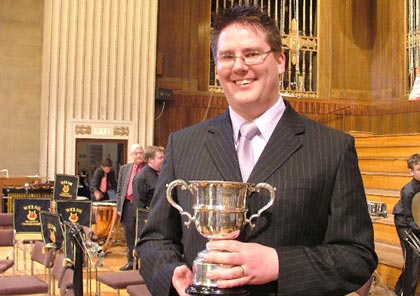
How's that for size: Paul Holland with his new shiny egg cup
There is little you can add really. It was perhaps the best performance of Howard Snell's ‘Images of the Millennium' of the entire Regional Championships, and perhaps one of only a very small handful that actually managed to possibly conquer it. The real contest in fact was to find which of the other bands was to join them at Harrogate.
The stature of Newbridge's performance also gave the contest a rather lopsided feel. With it you could argue the test piece justified its selection at this level as it was given such a fine account, but without it, it was in reality another Second Section contest that saw competing bands in various states of distress. There were performances that through no fault of the bands here that verged on the catastrophic.
David informed the audience with a neat sidestep that Phil Bennett would have been proud of, that the test piece was ‘enjoyable but demanding' and that the composer himself had wanted it to be accessible. "You be the judge of that," he craftily said. The audience gave a warm knowing chuckle. They had heard too many performances that had struggled on the day and were pleased that the adjudicator hadn't gone for the safety first approach of just congratulating the bands on their efforts without explaining exactly what he thought.
David in fact gave a detailed synopsis that covered each of the three movements, using the programme notes from Howard Snell as a template so that the audience knew what the composer's intentions were. He then explained where the bands did well, and where they didn't, including tempo's (120 in the third movement brought him to declare "Dear me!" for some attempts that were way above that) and dynamics and balance (the Nocturne's need to be played in a dreamlike state).
It was a classy bit of work from Mr Read, and so when he came to tell the audience that there was the one outstanding performance, one that was ‘creditable' in his words, whilst others found it difficult, the audience knew exactly what he meant. It was very much appreciated.
Newbridge Celynen of course where the one outstanding performance.
The band has attracted a fair amount of unfair criticism in some quarters that its aggressive recruitment policy has distorted the value of its fine run of success at local and regional contests. True, the band does contain a fair share of old Championship Section lags who have done their time in the gulags of the top section bands in the Principality, but then again, if they want to continue playing, who is to say at what level they should enjoy themselves.
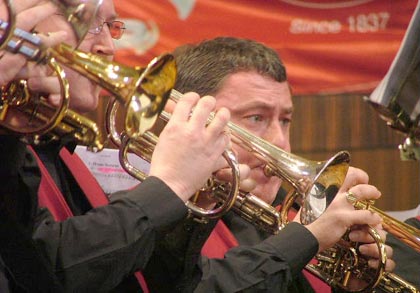
Old lags keeping the juices flowing: Newbridge head for victory
The hairlines may be receding in some cases and the waistlines increasing in many more, but what they haven't lost is their desire to perform as well as they can at whatever level they choose to play at. Unlike some juices, the competitive ones still flow feely in the veins.
That isn't unfair to any other band (and they could only manage 5th place at the National Finals in the Third Section last year), that is just the way it is.
Their performance in fact didn't start to well with an opening to the Scherzo that took a little time to settle. Thereafter the quality shone through and with some excellent soprano playing in particular (from Ellie Holland, who to our knowledge has never played in a top section band) it had just the right playful feel and plenty of detail and balance.
The Nocturne was well handled with a neat sense of style and dreamy approach, before a compact and detailed Odyssey that benefited from a sensible approach to the dynamics and the need to keep something in reserve right to the end. It was a very high class performance that fully justified its marks and its win.
The old lads may have celebrated more with a cup of Horlicks than cider and black, but celebrate they did, and it was fully deserved.
Joining them at the finals will be Tylorstown (Arriva Trains) conducted in neat style by Garry Davies. With only two trombones (that we could see anyway) the MD certainly made the most of his resources and produced just as David had said, a very creditable account of a very difficult test piece.
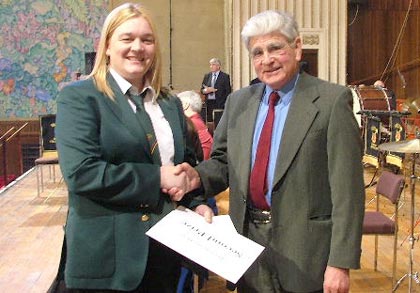
Read all about it! David Read congratulates Tylorstown on their second place
It didn't have the overall quality of the winners for sure, but it did benefit from some super solo cornet and solo euphonium work and an intelligent approach to the tempi and balance. The opening movement in particular was just taken a notch or two below the marking on the score which allowed clarity, whilst the second movement was just pushed along a little more than marked to give it a sense of flow and take some of the strain off the players.
The final movement got hard and strained as stamina started to wane, but overall it was a good effort and deserved its second place without a doubt.
After these two performances, it was a question of the best of the rest, or if we are being truthful about it – the least worst performance.
That certainly came from RAF St Athan resplendent in uniforms that had more gold braid on them than General Galtieri and the Argentina Junta put together could muster.
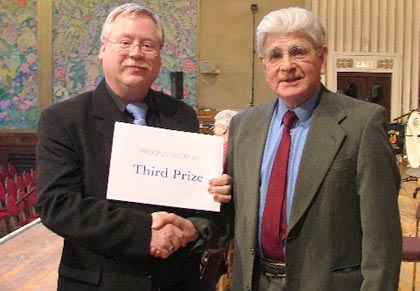
Bourne Three: Alan Bourne takes third prize for RAF St Athan
They too benefited from a fine bit of soprano playing from Claire Bourne who really did add something throughout, whilst the MD did his bit to make the most of his resources with an intelligent approach to the dynamics and tempi. That the execution didn't quite match the approach was no fault of the band, but it did contain enough moments of good playing to mark it out from the rest of the contenders that came below them. The best of their playing came in the Nocturne where they really did come close to the dreamlike quality required.
Newtown Silver rounded off the contest with a decent account that started well but just fell away the longer it went on. The four troms were used to good effect, but it was an early bass entry in the first movement that caused the ensemble to rock for a time, whilst the second movement had security but lacked colour. 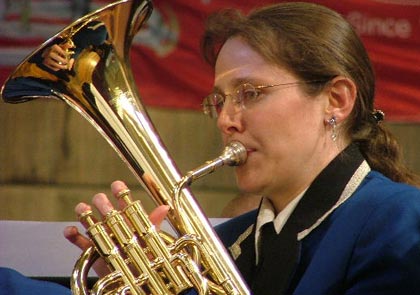
A picture of concentration: Newtown's horn player makes sure its a F#
It was the final Odyssey that took its toll though. Steve Edwards really worked his socks off with the band, but not even as good a band trainer as he is could have made more of the piece.
Lewis Merthyr started the contest in much the same vein. Lyndon Price is a fine band trainer but even he found it difficult to delve any deeper into the piece than trying to ensure the technical challenges were met and the stamina of the band was kept in place right up to the last note.
And try hard he did, but the piece just beat a decent Second Section band with a great deal of promise into the ground. For every good moment there were two that they just couldn't overcome and by the end it sounded tired and harsh. A pity, but they were not alone with this, either on the day or around the country.
It was the same story with Conwy Town who followed them on stage with a performance that couldn't, despite some fine efforts from individuals and the MD, rise above the mediocre. The three percussion players played their hearts out, but the piece defeated them and their fellow players. To perform as they did was admirable, but to be asked to by the Music Panel with this choice of test piece was nothing short of a disgrace.
Briton Ferry too played with their hearts on their sleeves (and their lips on the floor by the end) under DR Christian Jenkins, and their percussionists also tried just about every trick in the book to camouflage and powder over the most obvious cracks in the brass ensemble. Now and again it worked, but for the most part it couldn't, so by the end it petered out into a struggle. Another band defeated by an inappropriate test piece choice.
Paul Lovatt Cooper couldn't have asked for a more difficult baptism to make his conducting debut at the Welsh Regional with Royal Buckley and he and his band must be congratulated for their brave attempt at meeting the demands of the set work. In the end they could quite do it, but then again, with the exception of Newbridge, who could in fact. They will return and taste success we are sure in the future, but not if they, and others are subjected to tests such as this.
Finally, Ynyshir (Stack of Tiles) under their new MD. Once more it was a question of making what they could from the severities of the score, and although they too put up a worthy effort, they left beaten, but we suspect unbowed by the experience. It may not have been pretty but it was determined and full of Welsh hywl.
The overriding impression with the Second Section was one of disturbing anger. Not at the bands, but at the choice of the test piece. Apart from Newbridge, here were seven bands who laid their guts out to try and conquer a piece that had no business being set at this level. In relative terms they all failed, some more than others. But what good has that done for them? None at all if you ask us.
Iwan Fox.















